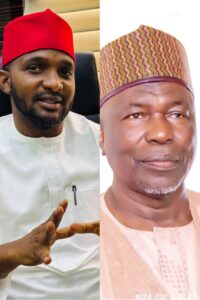
By Shehu Musa Gabam (Makaman Tilde)
Nigeria came to be in 1914 after the amalgamation of the Northern and Southern Protectorate by Sir. Frederic Lugard the former Nigerian Governor General and was officially pronounced an independent country in 1960 after series of agitation by our founding fathers who have made outstanding and remarkable sacrifices that generations will continue to read from the nations history books of the collective struggles that give birth to what is called Nigeria today .
The founding fathers have the zeal to champion the course of better Nigeria which was driven by their collective conscience and patriotism to laid a solid foundation for a country that will compete with all the developed countries of the world today. Those tenets and principles to which Nigeria was built upon have been shattered away by Successive governments that abandoned completely such foundations to make the country great. Nigeria has failed to speaks its national slogan of unity and faith ,peace and progress a symbol that bind over 400 tribes together which is gradually becoming a fairy tell as injustice ,impunity and lawlessness taking over the main stream of governance.
Nigeria is Africa’s wealthiest, most populous nation, and its fastest-growing economy. Despite this, more than half of the country lives below the poverty line, and northern Nigeria suffers the world’s third highest level of chronic undernutrition among children. This silent crisis is caused by lack of access to safe water and sanitation, rising food insecurity, the disruption of basic services due to conflict, and poor knowledge of healthy feeding practices for infants and young children.
Nigeria has faced insecurity due to conflict with armed insurgent groups. Civilians have limited access to assistance, and food remains a major need in displacement settlements. Prolonged absence of food security, livelihoods, healthcare, education, clean water, sanitation and hygiene facilities exacerbate risks. Protection concerns include arbitrary detention, forced conscription, domestic violence, forced and early marriages, trafficking, sexual exploitation and abuse.
Nigeria is still dancing in the same arena field with many poor counties of the world despite its abundant natural resources which should have set the country on the pedestrian bridge of economic prosperity like USA and UK .Lack of Economic plan has succeeded in putting Nigeria in serious jeopardy and lack of continuity in some of the nation economic policies remain a major problem that is keeping the country within the same rotational table 60 years after independent.
Eight out of 10 of the world’s poorest countries are suffering, or have recently suffered, from large scale violent conflict. Wars in developing countries with heavy human, economic, and social costs are major cause of poverty and underdevelopment.
The deaths caused by insurgency in the North East, Farmers /Herders clashes in the North Central, Bandits, kidnapping and Niger Delta militants constitutes more than 80% of the Nation total deaths every year . Most current conflicts in Nigeria are within states which speaks the volume at which bad governance and injustice has been growing across the States of the federation posing a great danger ahead.
NIGERIA FIRST ECONOMIC PLAN.
Nigeria’s first attempt at comprehensive and integrated planning took the form of the First National Development Plan in 1962. The plan included an aggregate growth rate target of 4 per cent per annum, an increase in the rate of investment from 11 per cent to 15 per cent of GDP and an increase in the ‘directly productive component’ of government investment (Bevan et al. 1999: 30). To encourage industrial development and lessen dependence on foreign trade, import substitution industrialization (ISI) was introduced conserving foreign exchange by producing local products that were previously imported. Import duty relief, accelerated depreciation allowances, and easy remission of profits aimed to attract foreign investors. The period of this plan witnessed the commissioning of energy projects such as the Kainji Dam and the Ughelli Thermal Plants, which provided a vital infrastructural backbone for the emerging industrial sector. Other important industrial infrastructure included an oil refinery, a development bank, and a mint and security (p.118) company. Clearly, the main objective of the ISI strategy was to stimulate the start-up and growth of industries, as well as enhance indigenous participation.
However, it led to high technological dependence on foreign know-how, to the extent that the domestic factor endowments of the country were grossly neglected.
CAUSES OF NIGERIAN UP RISING
Both political and economic analyst in Nigeria shared similar opinions that long eroded of the country’s principles and values of good governance remain a serious treat to our survival. So many factors may be responsible for Nigerian protest and agitations in Nigeria but the most common known to all and sundry comprises the following.are penciled out among to many to mention as elements that post a great danger to the survival of Nigeria .
(1) Allocation of more than 70% of national wealth been consumed by less than 20% of Population leaving only 30% to critical infrastructures like railline, Power, health, Education, Roads network and welfare of the greater Majority.
(2) Lack of government policy and actions plans sustainability of late tenets left by our founding fathers.
(3) Abuse of the nation standard principles of recruitment processes due to pervasive corruption .
(4) Lack of employment and high growth of prevalent of insecurity.
(5) Electoral fraud and malpractices,
poverty and abuse of the constitution.
(6) Injustice against the governed by the privilege few in position of authority.
WAY FORWARD/SOLUTIONS .
Nigeria as a country has both human and natural resources to grow to it’s peak of development and compete with all developed countries of the world if good governance will be allow to prevail. We must raise our shoulders high and face the reality of live before it is too late. The #Endsars protest which was later hijacked by some hoodlums has thought us a great lessons that all is not well with Nigeria and we must act before it is too late to salvage the only country we have as no Nigerian want to be a refuge elsewhere.
(1) Government should as a matter of urgency cuts the cost of governance and channels it National Budgets towards reorientation of agriculture as a means to diversify the economy according to the 1962 Nigeria Economic plan .
(2) Reorientation of public expenditures in the productive sectors towards rehabilitation and maintenance of the nation critical infrastructures like Rail lines, Health care System, Education and Power .
(3) Increased taxes on the imported consumer goods to boost the nation local industries.
(4) Holding nominal wages fixed and/or raising them by significantly less than required to make up the effects of inflation by slashing the cost of maintaining the office of the President, vice President, National Assembly and Nigerian Governors Offices, Ministers and Political appointees.
(5) Liberalization of the import regime through Government interventions to fund local Production by providing subsidies to boost local production to create more jobs to the teaming young Nigerians.
(6) Substantially raising nominal producer prices for agricultural cash crops to limit real declines,price controls,increased competition and flexibility in agricultural marketing .
(6) Privatization of government-owned assets like the national grid and Refineries and concentrated efforts to raise efficiency in remaining government institutions.
(7) The federal government should concentrate more in employing more of its Youths into the Security architecture to compete with the ratio of our growing Population (2.06M).


